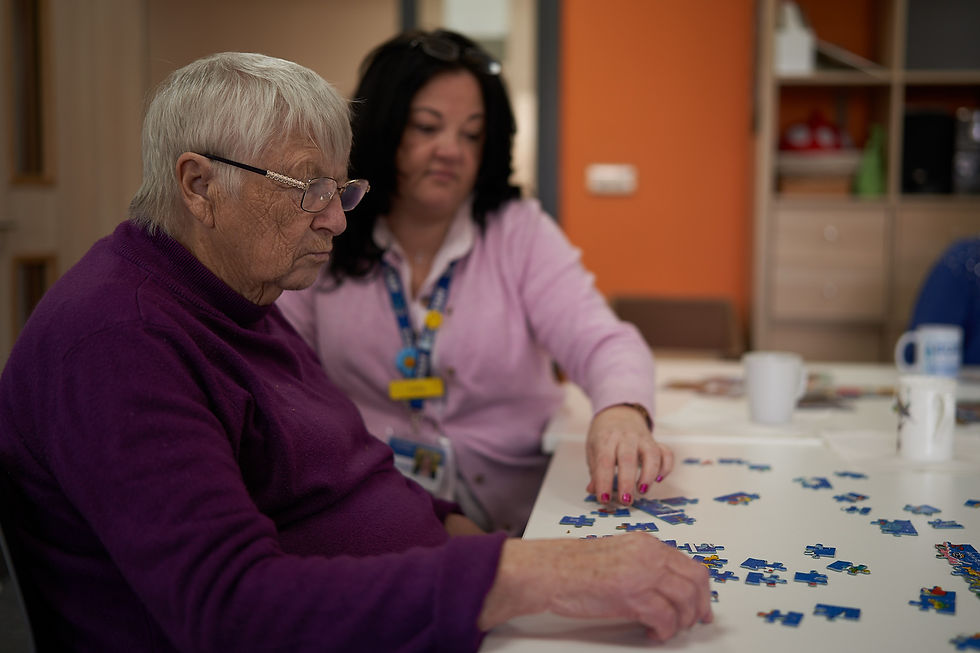Why is Social and Mental Stimulation Important When Living with Dementia?
- Dementia Support

- Aug 16, 2023
- 3 min read
Updated: Aug 26, 2025
Everyone will receive a diagnosis of dementia differently. For some it may be a relief, for others a complete shock. It’s important to take some time to absorb this news in your own time and in your own way. For family members too, this can be a time to pause and reflect on what the future may hold. If you’re struggling with a recent diagnosis or would like to talk about starting a life living with dementia, our Wayfinding Team offers qualified, 1-2-1 support for anyone affected by dementia.
As you navigate the early stage of any diagnosis it’s crucial to remember that, while the future may now look a little different, it’s absolutely possible to live your life fully, with a few small adjustments. Adopting some basic good habits will give you the best chance of continuing to live well alongside a dementia diagnosis:
A form of regular exercise
And, social and mental stimulation.
What is social and mental stimulation and why do they matter?
Social stimulation

The human race has been so successful because of its ability to communicate and form communities and societies. This need for interaction and communication is a big part of what makes us human and what maintains our emotional equilibrium. Regular social interaction has been linked to fewer instances of depression and improved mental health.
Of course, people have different levels of sociability; some enjoy mixing constantly, whereas others prefer to dip in and out of socialising. Everyone is unique in their social preferences. It’s also entirely normal for these preferences to change after a diagnosis of dementia. Previously sociable people may find themselves retreating from big social occasions for a number of reasons:
Loss of confidence
Changes in memory function
Worried about behavioural changes
Basic preference changes
Concerns about physical safety outside the home
Risk of overstimulation exacerbating symptoms of dementia
While social interaction should be encouraged, the needs of the individual living with dementia should remain the priority. This might mean that adjustments need to be made. Before planning a social event as someone living with dementia, or as a loved one in their support network, try to consider:
The time of day – when will it fit best with important routines?
The number of people – too many people can feel overwhelming
The type of activity and the space it’s held in – could the environment confuse, distress or unsettle?
Preparation – letting venues and friends know in advance so that they remain patient and supportive during any social occasion
Depending on the stage of the dementia, remaining in contact using technology can also be helpful. If family and friends live further away, visiting is not always practical - video calls are a great way of staying in touch and maintaining bonds.
There are also a number of clubs and activities run by the team at Sage House, where you can feel absolutely confident that the needs of the individual will be a priority at all times. You can find out more about our activity timetable here.
Mental stimulation

While there is currently no known cure for dementia, there are ways to manage it and even slow its progression. “Brain training”, puzzles and other games have all been shown to have a positive effect on the cognitive ability of people living with dementia. They have also been shown to improve emotional well-being and general outlook on life.
Cognitive Stimulation Therapy (CST), is an evidence-based therapy for people with mild to moderate dementia. It involves themed activities which take place in a group setting a few times a week. It’s the only non-medical therapy endorsed by the UK government for the management of symptoms of dementia. You can find out more about the CST sessions we run at Sage House here.
If you’d like to talk about a way forward living with dementia, or get some inspiration on how to stay socially and mentally active alongside a dementia diagnosis, please reach out to our Wayfinding Team.
.png)


